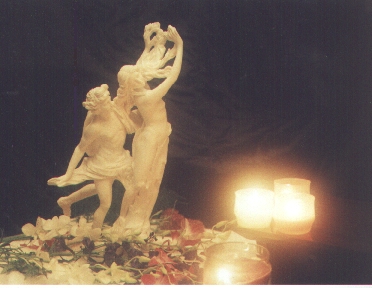

The afternoon light shone ever more brightly on the rocks of Parnassus, and Eros knew the sun god Apollo was approaching.
"Since his conquest at Python," the cherub quipped, "his radiance is eclipsed only by his vanity."
As the chariot passed overhead, Aphrodite’s mischievous son drew from his quiver a gold-tipped arrow and let loose a shot. The chariot faltered as the arrow found home in Apollo’s heart, and crashed into the mountains.
When the sun god regained his senses, he heard the gurgling of a brook and slowly opened his eyes. Before him stood the mountain nymph Daphne, daughter of Peneus, the god of the river. Water glistened on her bare skin; her hair cascaded down her back in rivulets of auburn, brown, and blond; and her eyes shone aqua. So many times he’d glanced down at her on his daily circumnavigation of the world, but never had he seen her up close; and never had love smitten him so spellbindingly with the enchantments of any girl or youth, goddess or god.
He pulled himself to his feet. "You are the fairest creature I have ever seen," he told her, bringing her soft hand to his lips. "You are fairer by far than even Diana or Athena. You must be mine!"
"My liege," she replied, lowering her head in deference, "your attentions flatter me. But I cannot leave my beloved mountains to circle the globe with you each day! Were I to leave here, the firs would droop, the birds cease their melodies, the wildflowers lose their fragrances. I belong here, my bare feet treading upon the moss, the breezes caressing my skin. Without me, what will become of my children, the deer, the ram, the bear? I cannot trade my peaks and valleys for your stratosphere; I cannot leave behind my world for your lofty flight through the ether-beautiful as you are."
"Your voice soothes my ears; your smile soothes my soul. I will have you, nymph."
"You ask me to forsake my very identity. I cannot do it, sire."
Seized with love and lust, Apollo gave chase to Daphne-through the forest, across the streamlet, up the rocks.
"Sire," she called back as he gained on her, "I shall not yield, yet I do love thee. And though I will not accompany you in your chariot, I shall be with you always."
Momentarily Apollo grasped Daphne, but as he touched her skin, it turned to bark; her arms grew into branches; her billowing hair sprouted leaves; her foot stuck fast in the ground, as a root; and her face retained nothing of its former self, save its beauty.
Horrified, Apollo collapsed, panting, beneath the laurel tree. "Why?" he implored.
With the rustle of her leaves, she whispered, "I shall never depart my beloved mountains. Yet now you may take me with you, where’er you fly."
"Daphne," the god replied, "I respect your choice, and am honored by your tribute. I shall take from your branches a wreath, and you shall crown my head with glory. Your seedlings shall multiply and dot the hills of the earth’s four corners, and you shall have life eternal. From high, I shall gaze down upon you every hour of the day, and my tears of joy shall fall and water your roots. My heart shall swell with your praises; and I shall give voice to your virtues with words; and henceforth I shalll be known not only as the god of the sun, but also as the god of poetry."
Daphne bowed her branches as Apollo took the leaves and wove them into a wreath. "Farewell, my love," she whispered as he climbed into his chariot and, in a blaze of liquid fire, climbed into the sky.